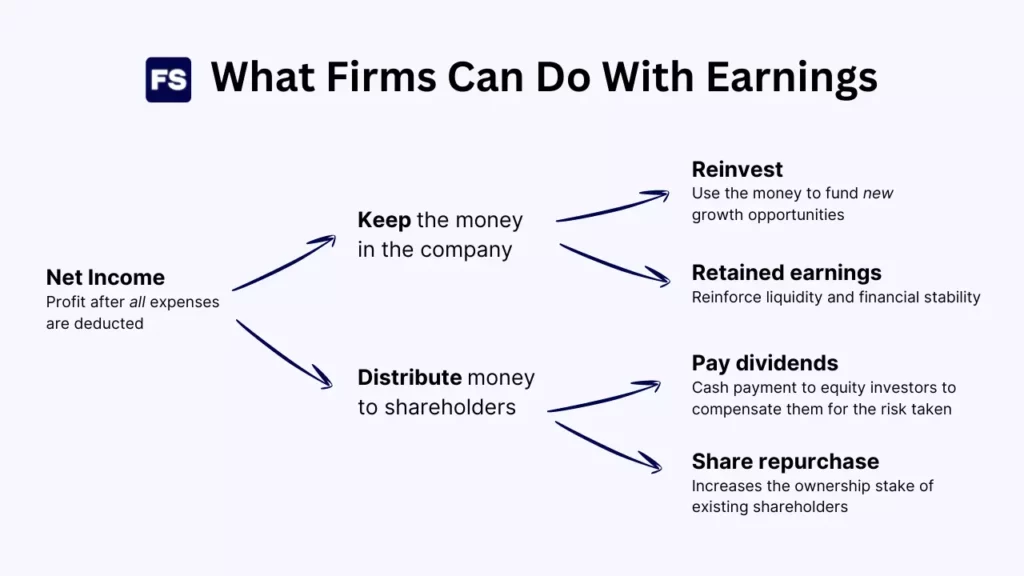Yes. Private companies pay dividends either from net income, retained earnings, or newly issued debt, just like public companies do. The only significant difference is more regulation in public companies.
That’s the gist of it.
For a more comprehensive look at how dividend policy for private companies works, keep reading:
Can A Private Company Pay A Dividend
Yes, a company does not have to be public to pay dividends.
Private businesses can pay dividends but are never required to pay dividends—and the decision to do so is ultimately up to the company’s internal policies and agreements between shareholders and management.

Dividends are a portion of a firm’s net profit paid to its owners—the shareholders.
If the company is public, the owners receive dividends.
If the company is private, the owners receive dividends.
Companies exist to earn profits and to pay returns to investors. And a dividend is the primary method of paying an investor.
Investors expect to be paid and compensated for the risk of parking their money in the business. The return they require is the cost of equity.
How much each shareholder gets is in proportion to how much stock they own. Whether the investor owns preferred stock or common stock will also influence how much they get—based on the characteristics of each class of stock.
In alternative, companies can choose to keep the cash and reinvest it into new projects, infrastructure, technology, or assets that will enhance their competitive position, increase market share, improve products or services, and generate future earnings growth.
How Dividends Are Paid Out In A Private Company
How do shareholders get paid in a private company?
The process is very similar to that of a public company. It’s just that there are no announcement dates such as in a public company. Or at least you and I won’t know about them. There’s no press release like in public companies.
Firstly, the company’s board of directors determines if there’s a dividend payment or not.
They consider factors such as the company’s financial performance, liquidity, and future growth prospects to decide whether or not to pay dividends—as well as how much.
If they decide to move forward with the dividend payment, the company will typically distribute it to its shareholders in the form of cash (a cash dividend). And the accounting team will need to register the transaction properly.
As is standard, the amount each shareholder gets is based on the number of shares and the type of shares they own.
Companies can also pay dividends in the form of additional shares or other assets, such as property or equipment. This is rare. Cash payments are the norm, but it is a way to pay shareholders while conserving cash.
Public vs. Private Company Dividends
Public companies are required by law to disclose their financial statements. The result? They’re subject to more scrutiny than private companies, as the Securities and Exchange Commission (SEC) requires transparency.
When a public company decides to pay dividends, it announces the dividend payment date, the amount per share, and the ex-dividend date—which is the date before which shareholders must own the shares in order to be eligible to receive the dividend.
Private companies have more flexibility in determining dividend payment dates and have different practices due to their ownership structure, looser regulatory requirements, and lighter oversight.
Unlike private companies, the dividend is always a cash or share payment. Paying every single shareholder of a public company with assets such as real estate would be impractical, to say the least.
Another important thing is that public firms need to think carefully about what their dividend policy signals to the market—lack of investment opportunities? Or perhaps excess cash? Private companies don’t need to worry about this as much because their stock price doesn’t fluctuate freely.
Public companies also have to follow regulations when it comes to paying dividends:
They must have sufficient earnings and cash flow to support dividend payments, and cannot pay dividends if doing so jeopardizes their financial health.
Publicly traded companies must also pay taxes on their dividend payments, which can affect how much money you, as a shareholder, receive. Investors pay personal tax on all dividends, whether they come from a private or public firm.
Lastly, it’s easier to see which public companies are unlikely to have sustainable dividend growth, due to the required clarity by the SEC.
For private companies however? It’s impossible to know which are overleveraged. Or even contracting debt to pay dividends to shareholders (dividend recapitalization) to the detriment of the company’s financial health—something common after companies are acquired by private equity firms. As a result, bankruptcies can pop up out of nowhere.
Overall, while both private and public companies can pay dividends, the process is more complex for public ones.
Frequently Asked Questions (FAQs)
Do companies have to pay dividends to preferred stockholders?
Companies have no obligation to pay any dividends to any shareholders—whether they’re common shareholders or preferred shareholders. Dividend payments are one of the four things a company can do with its net income. It can also repurchase its own shares to increase the value of each existing share, it can reinvest the money into the business to further develop it, or it can simply keep the profits in retained earnings for future use.
No. The directors of the company make the decisions regarding dividend payments, not the shareholders. Shareholders cannot force or demand dividends. Additionally, dividends can only go up to the recommended limits the directors establish. The only influence shareholders can have over dividend policy is through their votes regarding who the directors of the company will be.
When should a company pay dividends?
When it has a stable and predictable cash flow, and no better use for the cash. Paying dividends is a way for a company to reward shareholders for their investment and to attract new investors. However, it should not distribute dividends if doing so jeopardizes its financial health or its ability to invest in future growth. Before paying dividends, a company should consider its financial performance, cash flow, debt levels, and future growth plans.
